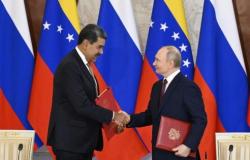After a failed attempt and taking advantage of the internal crisis that was generated in the business sector, the government of Javier Milei returned to the load in the last hours to try to knock down the settled parity between the trade employees’ guild and the employer. As he knew Page I12the minister of Economy, Luis Caputo, requested the Secretary of Labor, Julio Cordero, to meet the parties so that the agreement, which with the fixed sums reached a 9.6 percent increase, is not greater than 3 percent. In a nutshell, the officials want to prevent this salary table from being a leading case that is heating in other agreements, leaving those increases to reheat inflation.
Thus, the libertarians take advantage of how chopped the sea among the entrepreneurs: a few hours ago, the Chamber of Commerce (CAC) confirmed that it will pay the increase that was still signed with a caputo denied to homologate it, but faced ugly with the wholesalers and hypermarkets. The latter warned that until there is an approval of the government, the increase in salaries is not paid. In that context, the head of the CAC, Natalio Mario Grinnman, began talking to his terminals in the press to operate his message against his private peers.
They tell the bad languages that Grinnman, one of Milei’s favorite businessmen, is of bad moods since the government ordered to end a benefit that favored them. The reference is Decree 149, which decided that collective work agreements may no longer force companies to pay contributions to cameras or business associations, unless the companies themselves accept to do so voluntarily. That was a blow for both CAC and the Confederation of the Medium Enterprises (CAME).
Government pressures
The problem is that, in addition, the Milei government is pressing it continues, running it with the argument that the business support to the president cannot occur with the private ones increasing over the inflation pattern.
In one of the last talks that the CEO had with Caputo, the minister asked that the CAC cannot close and sign pearls that supermarkets cannot pay. It is that the hyper and wholesalers are the ones with the highest level of employees, measured in quantity, that is, they are the largest part of a giant parity, with 1.2 million registered workers. In this sense, it is also worth saying that the agreement was closed on the settlement of salaries and the Government has it drawn and without homologous since last Friday, the application of the rises was also delayed. That gave an excuse to businesses to kick the payment forward.
-In this context, the guild took two clear actions: the first, to publicize the signing of the agreement, which shows that the private ones approved it and that, in addition, there is a clause that forces the parity to be paid yet without official homologation. The second, that if the issue of payment in wholesalers and Super is not resolved, could summon assemblies in workplaces. The private ones, in any case, say that somehow will have to pay what was signed.
The background of history is Milei’s request to not validate wages greater than 1.8 percent. This maxim found a lock in the parity of commerce, because the final number that was achieved is 9.6 percent, that is, it is very complicated that the logic of lowering the general number to the roof required by the government can be applied so that prices are not triggered.
The “anti toto” clause
As stated by the Infogremial Portal, the Federation of Employees of Commerce and Services (FAECYS) decided, in the middle of the dispute, to circulate the document of the joint agreement signed by the parties. In detail, the pact that Faecys signed with the employers includes an update of 5.4 percent divided into three months. If the negotiated and approved fixed sums are included, the final number is 9.6 percent.
If you look in detail, the agreement remains as follows: 1.9 percent increase in April, more fixed sum of 35 thousand pesos; rise from 1.8 in May, with a fixed sum of 40 thousand pesos; and increases of 1.7 percent plus fixed sum of 40 thousand pesos in June. Those amounts are paid as non -remunerative and incorporated into the basics in a staggered way since July.
In parallel, the agreement has a classula that takes legitimacy to the government’s intention that no rises are paid over inflation. Article 10 specifies that “(…) in the case of the approval of the agreement is pending and maturities of the deadlines agreed for the payment of the increases in the staggered form provided for, the employers will pay the sums accrued with the mention“ advance payment in account of the Collective Agreement April 2025 ”, the one that will be replaced and compensated by the corresponding items once approves the agreement.”






